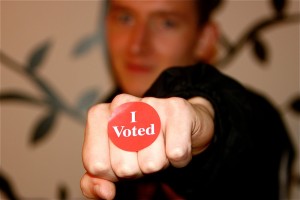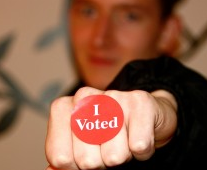A 700-participant U.S. National Institute on Child Health and Human Development study concluded that a parent’s beliefs and parenting style impacts their child’s personal political affiliation.
Sister Katarina Schuth, sociology professor, said she agrees with the results.
“Children will very often adopt their parents’ views on a wide variety of topics, including political preferences,” Schuth said. “The children tend to follow their parents on any typical issue.”

In the study, parents were asked several questions about their parenting styles. The study concluded that people raised in a more authoritarian setting tended to be more conservative, and people who were noticeably shy as children were also more conservative.
Sophomore Sam Olson said he thinks his political affiliation can be attributed to his parents.
“My parents’ jobs require them to not endorse anyone or be listed as Republican or Democrat. I have an independent mindset because they do,” Olson said.
Junior Carley Jorgensen said she can see either side of the issues, but feels that college also plays a large role in shaping a person’s political views.
“I think that being a college student makes me much more open to ideas and having a more broad liberal outlook,” Jorgenson said. “Still, I feel like because my parents raised me, that their ideas of politics have fallen on me too.”
Junior Joseph Moss said he can relate to the study. He said he was shy growing up, which he believes had an effect on his political views.
“Generally speaking, I vote Republican, but that is solely defined by my conscience, which was brought up in a strong Catholic Christian tradition,” Moss said.
The study also showed people raised in a more egalitarian manner, where they were allowed to disagree with their parents often, would identify themselves as liberal. In addition, people who are extroverted would be more likely to vote democratic. The researchers addressed several variables, including gender, ethnicity, and socio-economic standpoints.
Senior Kasey Buchmiller said she doesn’t think would fit into the study’s results. She identifies herself as a conservative, but according to the study, her upbringing suggests that she would be a liberal.
“In my first election, my mom and I voted for different candidates. She made it a point for me to educate myself and to not let her opinions sway what I thought was the right party affiliation for me,” Buchmiller said.
Schuth said that both a parent’s personal party preferences and methods of raising children have an impact on their children’s political views.
“Parents are the most influential people in a person’s life,” Schuth said. “Their families shape their lives.”
Kayla Bengtson can be reached at beng2004@stthomas.edu.




Interesting, but hardly the first study on this topic. Although this is the first study I’ve ever seen that found a correlation with extraversion. For those interested in personality and political behavior, search “Political conservatism as motivated social cognition” for a more comprehensive review.